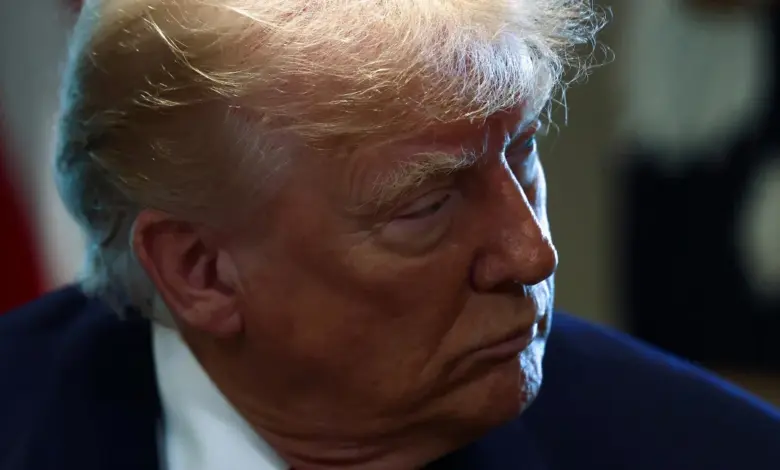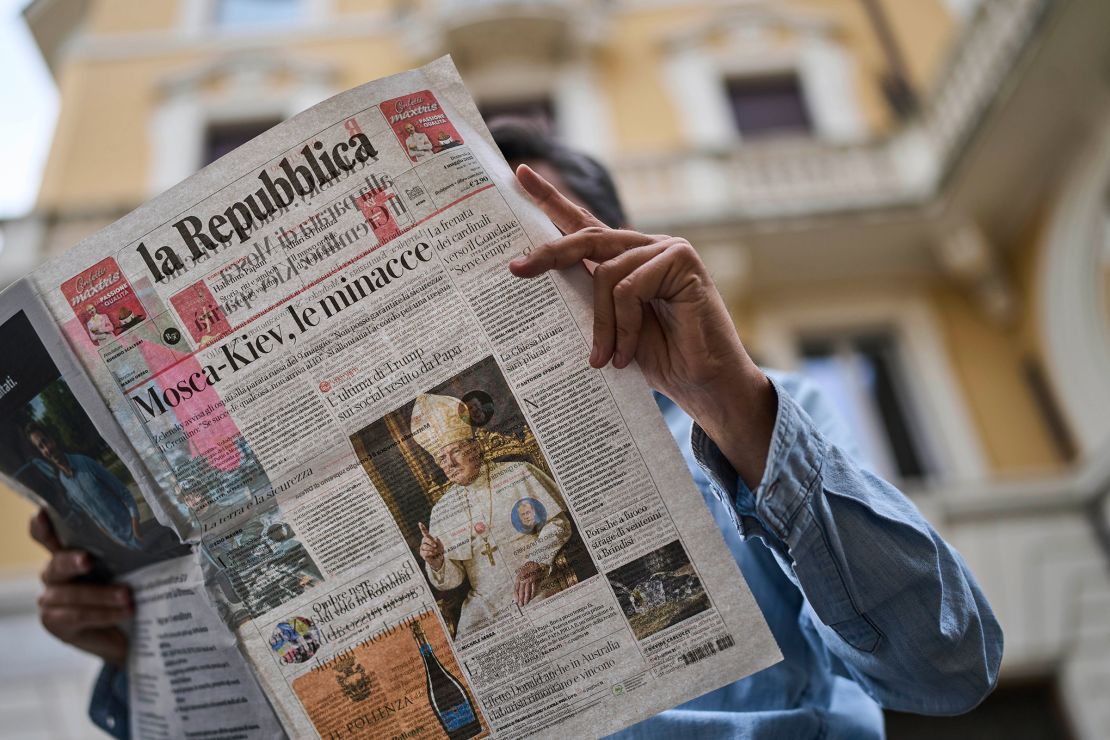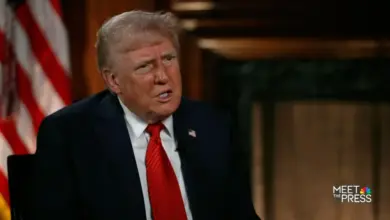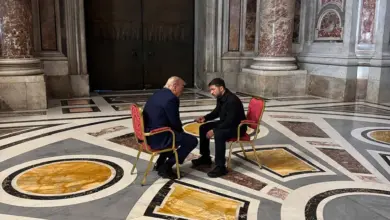
Americans are learning what it’s like to live with a president who sees no constraints on his actions and who apparently fears paying no price for them.
In a blitz of recent policy moves, legal challenges, comments and interviews, Donald Trump is showing that he’s shedding the last limitations of custom and the public’s long understanding of how a president should behave.
In an interview with NBC’s “Meet the Press with Kristen Welker” that aired in full Sunday, Trump said for instance, “I don’t know” when asked whether he needs to uphold the Constitution, three months after swearing an oath to do so.
As always, Trump’s attacks and expansive policy initiatives seemed aimed at shattering normality and wrong-footing enemies, while creating fear and the impression of unstoppable momentum among his critics.
Trump is also honoring supporters delighted by his assault on what they see as disdainful and liberal-dominated political, legal, educational, media and military establishments. Top aides argue that his extreme actions are justified by his election victory and works — for instance, in his stemming of southern border crossings.
But Trump’s behavior also points to darker potential outcomes of a second presidency fueled by his belief that he has near-uncheckable power after a second electoral triumph that followed his defiance of personal legal woes and two assassination attempts.
The administration is repeatedly defying federal courts — in one case even the Supreme Court, over the fate of an undocumented migrant whose return it ordered the administration to “facilitate.” Trump is meanwhile wielding vast executive power against institutions that he wants to silence, including law firms and universities.
And his sense of personal omnipotence sometimes seems to be leading the country toward authoritarianism. He said on NBC he wasn’t “looking at” running for a third term in 2028 — as if it’s a personal choice whether he obeys the Constitution on which US democracy depends.

Even Trump’s humor is rooted in the quest for power
Trump’s talent for trolling also reflects his hubris and pursuit of ultimate power.
A composite image he shared on Truth Social of himself in papal vestments was surely meant to infuriate critics his acolytes could then mock as lacking a sense of humor — a familiar MAGA strategy. But the image, an offensive one to Roman Catholics, who view the pope as the guardian of the keys to the Kingdom of Heaven, is a knowing nod to Trump’s claims of infallibility. It was also shared on the White House’s X account — thereby becoming one of the most extraordinary official documents ever issued by the United States government.
And Trump’s plan for a major military parade to celebrate the Army’s 250th birthday in June may be another sign he’s adopting dictator kitsch.
The event is likely to draw scrutiny beyond the cost of moving tons of expensive troop formations and aircraft at a time when the administration is gutting the federal government to save money. Trump has wanted such a spectacle since attending a Bastille Day on France’s national day in his first term. But this parade is expected to take place on the commander in chief’s birthday in June.
Monarchs have military pageants for their birthdays, but modern US presidents have tended to shun such displays of personal adulation that blur the notion that troops in a republic serve the people and not an omnipotent ruler. The US has also felt no need to boast of its power at the kind of propaganda jamborees preferred by the leaders of the former Soviet Union and North Korea. But Trump said on NBC, “We have the greatest missiles in the world. We have the greatest submarines in the world. We have the greatest army tanks in the world.” He added, “We have the greatest weapons in the world. And we’re going to celebrate it.”
This was characteristic of a growing administration trope — to imply that those who are queasy at such displays of presidential power are unpatriotic, hostile to the military or humorless. This allows it to dismiss any concerns over Trump’s incessant grasping for every symbol of sovereignty.

Growing disconnects on economic policy
But Trump’s power grabs may also be blunting his political instincts.
While his tariff policies are intended to bring jobs and manufacturing back home and to lift up working Americans, he’s appearing increasingly oblivious to their impact on regular people. This disconnect, shared by other billionaires in his Cabinet, could have risky implications for his own political fortunes and for Republicans in midterm elections, not to mention the economy more broadly.
For instance, a couple of days after warning American children might have to settle for fewer, more expensive dolls because of his trade war with China, Trump implied in the NBC interview that the economy would be “OK” even if it slipped into a recession. He also dismissed the impact of looming supply chain shortages on the population. “They don’t need to have 250 pencils. They can have five,” Trump said.
The implications of the China trade war go beyond pencils and dolls. Unless there is an imminent breakthrough, US consumers will lose access to many affordable and plentiful goods, such as sports equipment, shoes and clothing. That will put enormous pressure on family budgets. Small businesses based on importing such products may meanwhile go bust.
It’s not the first time Trump has seemed removed from the struggles of ordinary families. He keeps insisting he’s brought grocery prices down after the cost of living was a huge issue in the 2024 election. But every American shopper who goes to the supermarket themselves knows that’s not true.
And Trump insisted in an interview with Time that “I’ve made 200 deals” with nations seeking to avoid tariffs. Despite constant promises of imminent trade pacts that will transform the US economy, the administration still hasn’t announced any.
The question of the president’s grip on reality is an important one and takes on extra weight given Trump’s previous attacks on former President Joe Biden over his age and cognition.
Such concerns will not be alleviated by a bizarre answer in his NBC interview. “We lost 5 to 6 billion dollars a day with Biden. Five to 6 billion,” he told Kristen Welker, then went on to explain his 145% tariff on China: “We’ve essentially cut off trade relationships by putting that much of a tariff on. And that’s OK. We’ve gone cold turkey. That means that we’re not losing.” In other words, Trump has narrowed the trade deficit with China by halting trade altogether, a cataclysmic option that could deeply scar the US economy.
The president gets away with such displays of rule by whim because he learned from his first term and appointed new officials who won’t challenge him. In a televised pageant of sycophancy last week, his Cabinet members showed they understand their role is to laud him. And congressional Republicans gave up their power to check him.
“I don’t want to lessen President Trump’s leverage by undermining him whatsoever,” Wisconsin Republican Sen. Ron Johnson told CNN’s Jake Tapper on “State of the Union” on Sunday. “President Trump has a negotiating strategy, a negotiating style. I think he’s throwing the entire world out of balance.”
Democratic Sen. Mark Warner told Tapper that while Republicans were willing to buy into the “trust Trump” mantra in public, they were becoming increasingly concerned in private. Regarding the president’s attempts to hollow out the intelligence community, for instance, the Virginia senator said, “I had one member say, ‘Mark, you’re sounding like our conscience.’ I don’t want to be your conscience.”
Warner added, “I do think we’re getting close to them stepping up. … But the problem is going to be, how much structural damage is going to be done before my Republican friends find their voice and voice publicly what they’re already saying privately?”
Trump also has imperial ambitions
Presidents have even more power over foreign policy than they do at home.
And Trump plans to use it.
Asked whether he’d use force to fulfill his expansionist designs on Greenland, Trump told NBC, “I don’t rule it out. I don’t say I’m going to do it, but I don’t rule out anything. No, not there. We need Greenland very badly.”
The Arctic landmass is an autonomous territory within the kingdom of Denmark. So, a US invasion would not simply be illegal. It would mean the forcible annexation of land under the jurisdiction of a NATO member by the country that was once the alliance’s bulwark.
Canadians, who just voted in an election shaped by Trump’s demands that they join the US as the 51st state, will no doubt be relieved to know they need not fear a US blitzkrieg. “I don’t see it with Canada. I just don’t see it, I have to be honest with you,” Trump told Welker.
As with many of Trump’s wildest aspirations, his supporters argue that critics take him out of context and ignore the negotiating genius that lies behind his extreme positions.
It was newsworthy that Trump ruled out the use of force against Canada. That alone shows how his second term has inverted what had been long-standing international, legal and constitutional norms.




